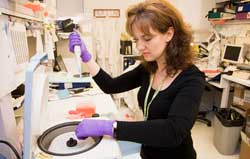Scientists Score High with Operating Funds
By Eleni Kanavas
The Canadian Institutes of Health Research (CIHR) awarded eight researchers from all three research platforms at Sunnybrook Research Institute (SRI) operating grants totaling $4.8 million through its September 2011 competition.
"In as competitive a funding climate as exists now, this is incredibly noteworthy, and a testament to the excellence of our faculty," said Dr. Michael Julius, vice president of research at SRI and Sunnybrook Health Sciences Centre.
The agency awarded Dr. Michele Anderson, a senior scientist in biological sciences, $791,037 over five years. She is studying the roles of transcription factors HEBAlt and HEBCan in T cell development and gene expression. Research in this area will provide insights into the molecular control of immune cell development, and new targets for diagnostic and therapeutic applications for immunodeficien- cies, autoimmune diseases and leukemia.
"I'm grateful to be given this funding because it is crucial for our research," says Anderson. "We're still in the early stages, and we have a lot of preclinical models that we are studying to understand better how HEBAlt works in stem cell culture. Its uniqueness makes it a possible target for therapeutics down the line."
Other SRI researchers granted funding through the CIHR competition are:
Dr. Jon Barrett, director of the Women & Babies Research Program, was awarded $438,577 over three years. The funds will enable Barrett to continue a twin birth study. The multicentre, randomized controlled trial compares planned caesarean section births with planned vaginal births for twins at 32 to 38 weeks gestation. Obstetricians and other health care providers may be able to use the results to help women with twin pregnancies make an informed choice about the different approaches to delivery.
Dr. Peter Burns, a senior scientist in physical sciences, was awarded $360,706 over four years to develop a new contrast agent using droplets of liquid perfluorocarbon for ultrasound imaging. His project aims to provide diagnostic information not available in current medical ultrasound images. This method may be used as a new technique to detect cancer.
Dr. Benjamin Goldstein, a scientist in evaluative clinical sciences, was awarded $569,980 over five years for his research on the possible link between bipolar disease and heart disease. Goldstein directs the Centre for Youth Bipolar Disorder at Sunnybrook. He is leading a team of researchers who are investigating if specific markers in the blood can provide a better understanding of mood symptoms and the increased risk of heart disease in adolescents with bipolar disorder.
Dr. Kullervo Hynynen, director of the physical sciences platform, was awarded $803,100 over five years. He will investigate the bioeffects of blood-brain barrier disruption by focused ultrasound. This research will guide the design of future clinical trials testing the technology.
Dr. Robert Kerbel, a senior scientist in biological sciences, will receive $781,655 over five years to conduct a translational study on the resistance of antiangiogenic therapies undertaken in preclinical models of locally advanced or metastatic cancer.
Dr. Jonathan Rast, a scientist in biological sciences, was awarded $361,800 over three years to study the gene regulatory network and central immune signaling factor IL17 to understand the coordination of immunity in the gut. Rast and his team aim to characterize the system and develop new approaches to controlling immune function.
Dr. Juan Carlos Zúñiga-Pflücker, interim director of biological sciences, was awarded $749,975 over five years. He is studying the characterization of progenitor thymocytes and developing an in vitro system that will support T cell differentiation. This research may have eventual clinical applications for the treatment of cancer, autoimmune disease and acquired immunodeficiency syndrome.
The agency received 2,294 applications through the competition and approved 506 of these, for a 22% funding rate.
PDF / View full media release »





